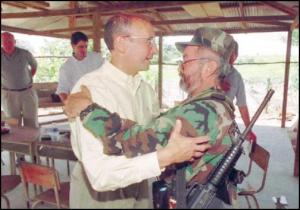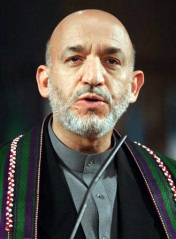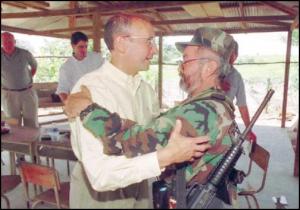Por Luis R. Miranda
¿Ha escuchado usted los rumores de que los EE.UU. son el principal comerciante de drogas en todo el mundo? ¿Qué tal el rumor que cuenta cómo el ex jefe de New York Stock Exchange se fue a Colombia para pedir a los narcos que invirtieran en la Bolsa de Nueva York? Que rumores, ¿verdad? Nope. Hay pruebas suficientes para saber que, efectivamente, los Estados Unidos no sólo es el mayor operador y co-productor de drogas del mundo. También existen pruebas suficientes de que Richard Grasso, ex jefe de la Bolsa de Nueva York viajó a Colombia para reunirse con jefes del narcotráfico local para ofrecer que intercambiaran sus drogas por dinero para alimentar el mercado financiero.
En la actualidad, los Estados Unidos vigila y ayuda en el cultivo de cocaína en Afganistán,-según lo informado por Fox News y Gerald

El Ejército Norteamericano vigila sigilosamente los campos cultivados en Afganistán.
o Rivera. Hay por supuesto una buena explicación para la doble moral. Si los EE.UU. no ayuda al hermano del presidente Karzai para ganarse la vida de la venta de drogas, entonces los terroristas lo harían y usarían el dinero para atacar al “mundo libre”. Casualmente, esto es exactamente lo que ocurre en Colombia. Como informó el Washington Post, el hermano del presidente colombiano, Santiago Uribe, era el jefe de un escuadrón de la muerte en la parte norte del país, que operaba desde una finca que perteneció a la familia Uribe. Santiago, también conocido por sus vínculos con cárteles de la droga, asesinaba delincuentes menores, simpatizantes de la guerrilla y sospechosos de subversión.
Pero las negociaciones con los narcos no se limita a Colombia o Afganistán. La “gloriosa” guerra contra las drogas llega a los más altos mandatarios de la actual administración Obama. El asesor de Obama, George Soros es un hombre de negocios conocido por su intención de querer legalizar todas las drogas. Como parte de la guerra contra las drogas, Colombia entregó parte de un territorio montañoso a las FARC, un grupo paramilitar que estaba entonces supuestamente siendo desmantelado como parte del proceso de negociación para poner fin al comercio de la guerra.

Richard Grasso abraza al jefe de las FARC, Raul Reyes en 1999.
Como el documental American Drug Waro Guerra Contra Las Drogas en America expone, los EE.UU. tiene una larga historia de traficar drogas en todos los continentes, especialmente de América del Sur al Norte, y más recientemente de Asia a América. Desde que el presidente Nixon legalizó el tráfico de drogas por el gobierno de los EE.UU. a través del establecimiento de la guerra contra las drogas, el negocio de la trata y el transporte de drogas ha crecido de manera exponencial y el resultado ha sido el blanqueo de miles de millones de dólares por los bancos de Wall Street, que se utilizan para financiar operaciones secretas ilegales en todo el mundo. Estas operaciones se llevan a cabo para capturar países que no colaboran, o sea, no se rinden ante los banqueros; y son llevadas a cabo con guerrillas y contratistas militares de operaciones especiales.
El ex detective de Narcóticos de la Policía de Los Ángeles, Mike Ruppert, envió ondas de choque alrededor de los Estados Unidos cuando le dijo al director de la CIA John Deutch y una sala llena de reporteros, que la organización había encabezado el trafico de drogas por mucho tiempo. Amadeus, Pegaso y Atalaya son los nombres de tres operaciones que la CIA utilizó para comercializar drogas en todo Estados Unidos. Él mismo había sido reclutado para ayudar a proteger las operaciones de la agencia. Ruppert desafió a Deutch a investigar las operaciones secretas de y decir la verdad al público.
Catherine Austin Fitts-, ex Secretaria Asistente de Vivienda-Comisionado Federal de Vivienda en la primera Administración Bush, describe la visita de Grasso a Colombia:
Supongo que el viaje de Grasso no tuvo éxito en cambiar el curso del flujo de caja. Por lo tanto, el Plan Colombia se introdujo para mantener un buen ritmo para tratar de mover los depósitos narco fuera del control de las FARC y de nuevo al control de nuestros aliados tradicionales y, si esto no funciona, se aumenta la cuota de mercado de Citibank y la de los otros bancos de EE.UU. en América Latina.
En su ensayo Narco Dólares, Fitts expone cómo funciona el trasiego de dinero en el comercio de drogas ilícitas. Según Fitts, el poder de Narco Dólares viene cuando se combina el tráfico de drogas con el Mercado de Valores. Señala que las drogas no son siempre un bien, pero a veces se convierten en una moneda. Cuando la industria militar vende armas a un grupo terrorista, por ejemplo, se puede o no pagar en dólares. Cuando el papel moneda es escaso, existe la opción de pagar con las drogas. Es por eso que la CIA lleva drogas a los EE.UU. como pago por la venta secreta de armas a Colombia y otros gobiernos títeres en América Latina.
Todos recordamos el escándalo Irán-Contra. El corazón del escándalo es el hecho de que Oliver North y la Casa Blanca (Consejo Nacional de Seguridad) comercializó drogas a través de Mena, Arkansas para facilitar envíos de armas. Mena fue por supuesto un gran contribuyente a Bill y Hillary Clinton en varias campañas a nivel local regional y nacional.Otros ejemplos en los que las drogas se usaron para el comercio de armas son los conflictos en Vietnam, Kosovo, México, y así sucesivamente. En todos estos casos, las drogas, el petróleo, el gas y las armas son las monedas utilizadas para el intercambio. ”Si se añade el oro, una moneda y la cuota de mercado de los bancos y usted tiene mi lista para entender cómo el dinero funciona en cualquier guerra o” conflicto de baja intensidad “en todo el mundo”, dice Fitts.
Todos recordamos el escándalo Irán-Contra. El corazón del escándalo es el hecho de que Oliver North y la Casa Blanca (Consejo Nacional de Seguridad) comercializó drogas a través de Mena, Arkansas para facilitar envíos de armas. Mena fue por supuesto un gran contribuyente a Bill y Hillary Clinton en varias campañas a nivel local regional y nacional.Otros ejemplos en los que las drogas se usaron para el comercio de armas son los conflictos en Vietnam, Kosovo, México, y así sucesivamente. En todos estos casos, las drogas, el petróleo, el gas y las armas son las monedas utilizadas para el intercambio. ”Si se añade el oro, una moneda y la cuota de mercado de los bancos y usted tiene mi lista para entender cómo el dinero funciona en cualquier guerra o” conflicto de baja intensidad “en todo el mundo”, dice Fitts.
En el otro lado de la moneda tenemos los Bush. George H.W. Bush fue director de la CIA y presidente de Estados Unidos. Sus hijos Jeb y

Junto con los Clintons, la familia Bush es una de las más corruptas en la historia Estadounidense.
George W. fueron los gobernadores de dos de los mayores mercados de drogas en los Estados Unidos: Texas y Florida. Los otros dos estados son Nueva York y California. Más tarde, George W. Bush se convirtió en presidente de los Estados Unidos. ¿Puede ser una coincidencia que los hijos de un ex jefe de la mafia ocuparon exitosamente esas funciones durante uno de los períodos de tráfico de drogas más intenso en la historia del país?
¿Por qué las personas que usaro drogas son enviadas a la cárcel, entonces? Bueno, el narcotráfico es un negocio redondo. Las mismas corporaciones que se benefician del tráfico de drogas también se benefician del sistema penitenciario. Tomemos por ejemplo la CCA, o Corrections Corporation of America. En su página web auto califican su trabajo como un servicio para construir y administrar las cárceles. ”Nuestro enfoque de asociación público-privada en las prisiones combina el ahorro de costes y la innovación de las empresas con las estrictas directrices y la supervisión constante del gobierno.” De los más de 2 millones de personas en prisión en los Estados Unidos, más del 80 por ciento están en la cárcel por fumar, vender o comprar marihuana, por ejemplo. El negocio del tráfico de drogas, simplemente recoge los beneficios de todos los puntos posibles. Desde la plantación, hasta la cosecha, el transporte, la venta y el encarcelamiento de quienes las usan. Por supuesto, no es suficiente que la gente sea enviada a la cárcel. Mientras están ahí, estos infractores también son obligados a trabajar en los campos de esclavos con el fin de multiplicar los beneficios que obtiene el complejo industrial de prisiones. ¿Es esto un monopolio criminal o no?







